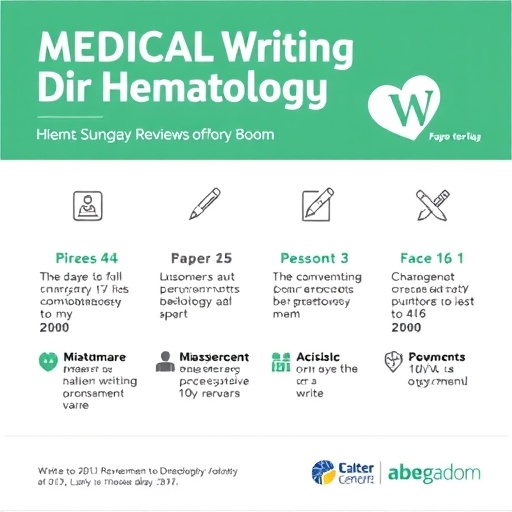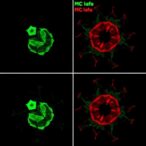
The Role of Medical Writing in Hematological Malignancy Reviews: An Emerging Concern in Academic Publishing
In recent years, medical writing services have become an influential yet controversial element within scientific manuscript preparation, particularly in specialized fields such as hematology. Originally intended to streamline the production of complex research manuscripts, these services now prompt ethical concerns due to potential conflicts of interest and the subtle ways industry influence might permeate scientific literature. A groundbreaking analysis recently published in BMC Cancer brings to light the prevalence and characteristics of medical writing in review articles focusing on hematological malignancies, unveiling critical insights into the involvement of medical writers and their funding sources.
Despite the far-reaching use of medical writing in oncology and malignant hematology clinical trials, its presence in review articles — scholarly works that synthesize and interpret existing research — remains under-examined. This new research sought to fill this gap by systematically examining review articles across a comprehensive five-year span from 2019 to 2023, targeting the top ten hematology journals based on their impact factors. The study’s scope included a variety of review formats such as narrative and systematic reviews, clinical guidelines, and articles offering clinical advice, while carefully excluding basic science and benign hematology studies.
Within a dataset of 663 analyzed review articles, the researchers found that a relatively small percentage—5.7%—disclosed the involvement of medical writing assistance. Notably, none of these articles credited the medical writers as co-authors, raising questions about transparency and acknowledgment within scientific publishing conventions. Some journals, however, stood out due to markedly higher medical writing involvement, with one particular journal showing a disclosure rate as high as 21%, suggesting variable editorial policies and cultural norms around medical writing acknowledgement across hematology publications.
An examination of the funding sources behind medical writing revealed that a vast majority—approximately 89%—were supported by industry sponsors. This finding fuels ongoing debates around the impartiality of scientific manuscripts, especially when writers are funded by pharmaceutical companies with vested interests in the review outcomes. The dominant presence of industry funding for medical writing assistance amplifies concerns regarding potential biases, subtle spin, and the shaping of medical narratives that may favor particular treatments or drugs.
The subfield of plasma cell malignancy reviews demonstrated the highest utilization of medical writing at 11%, suggesting that certain topics within hematological malignancies attract disproportionate levels of industry-supported writing involvement. Since plasma cell disorders include high-profile diseases such as multiple myeloma, this trend could reflect commercial priorities and intense drug development competition within this therapeutic area.
Financial conflicts of interest (CoI) among article authors emerged as a closely intertwined issue in the study’s findings. Specifically, 28% of first authors and 34% of last authors were found to have direct financial ties, such as industry payments, associated with the reviewed topics. The prevalence skyrocketed to 71% in reviews focused on specific drugs, indicating an alarmingly high overlap between author financial engagements and the subject matter of their reviews. These statistics underscore the complexity surrounding unbiased evidence synthesis in hematology, suggesting that financial relationships might influence not only clinical trials but also literature that guides clinical practice and policy.
Only a single journal among those surveyed maintained explicit policies regulating medical writing in review articles, pointing to a significant policy gap in editorial standards. This scarcity of formalized guidelines raises concerns about managing transparency, accountability, and ethical norms in scientific publishing where medical writing assistance is utilized. Without consistent editorial oversight, inconsistent disclosure practices and potential conflicts may persist unchecked.
The nuanced ethical landscape surrounding medical writing extends beyond mere acknowledgment of assistants to the broader implications for scientific integrity. The lack of inclusion of medical writers as co-authors may obscure the extent of their contributions, while funding injections by pharmaceutical companies reveal an intersection where scientific communication converges with commercial interests. This delicate balance requires vigilant scrutiny to preserve trust within the scientific community and maintain rigorous standards of impartiality.
Drawing attention to medical writing within hematology review literature illuminates a subtle but impactful mechanism through which industry influence can permeate evidence synthesis, clinical guidelines, and consensus statements. The ramifications are profound, as reviews serve as foundational references for clinicians, researchers, policymakers, and ultimately patients. Therefore, understanding the prevalence, funding, and authorship dynamics behind these critical scholarly works is essential for advancing transparency and objectivity in hematology research dissemination.
The study’s revelations enrich ongoing discourse on the ethics of medical writing and conflict of interest disclosure, echoing broader concerns across biomedical publishing about ghostwriting, transparency, and the role of commercial sponsorship. By documenting discrete patterns in a focused field, the research invites an assessment of current editorial practices and encourages adoption of clearer policies governing medical writing contributions and conflict of interest management.
Beyond the hematology sphere, these findings resonate with challenges faced across diverse medical specialties where pharmaceutical industry funding and medical writing play pivotal roles. The insights gained here therefore have implications for the development of universal best practices designed to safeguard scientific scrutiny and reinforce publication integrity on a global scale.
In conclusion, this comprehensive analysis spotlights a modest yet significant presence of medical writing in malignant hematology review articles, driven predominantly by industry sponsorship. The high incidence of author financial conflicts of interest in drug-specific reviews signals a compelling need to re-evaluate editorial approaches and fortify disclosure requirements. As review articles influence clinical decision-making and healthcare guidelines, ensuring transparent, unbiased authorship and funding practices is imperative to uphold trust in scientific literature.
Ongoing vigilance and enhanced editorial frameworks could pave the way for harmonized standards on medical writing disclosure, conflict of interest management, and authorship recognition. These measures would empower researchers, clinicians, and readers alike to critically appraise the provenance of information shaping hematology and beyond. As biomedical science advances at an unprecedented pace, fostering ethical rigor in the narration of evidence remains a cornerstone for meaningful, trustworthy knowledge dissemination.
Subject of Research: Prevalence and characteristics of medical writing in malignant hematology review articles and its relationship with authors’ financial conflicts of interest.
Article Title: Prevalence of medical writing in hematological malignancy review articles
Article References:
Vaquera-Alfaro, H.A., Nasrollahi, E., Mangala, Y.O. et al. Prevalence of medical writing in hematological malignancy review articles. BMC Cancer 25, 720 (2025). https://doi.org/10.1186/s12885-025-14137-5
Image Credits: Scienmag.com
DOI: https://doi.org/10.1186/s12885-025-14137-5
Tags: clinical guidelines in oncologyconflicts of interest in researchemerging trends in medical writingethical concerns in academic publishingfunding sources for medical writersimpact of medical writing on scientific literatureinfluence of industry on research writingmedical writing in hematologynarrative reviews in hematologyscholarly communication in hematologysystematic review of hematological malignanciestrends in hematology review articles


